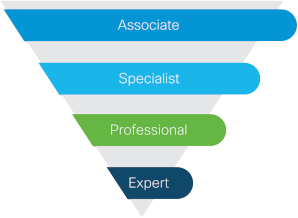Everybody is aware of the different technologies or advances that are impacting our workplace (e.g. Blockchain, AI, Machine Learning, Automation, etc.). In my case, as a network engineer, I see the silos crumbling and companies still trying to figure out, who and what are the resources needed, or how to transform their processes to align themselves, so they can leverage these technologies.
Personally, I think that the best way to solve these questions, is to understand the underlying dynamics or ways of working of the people involved in them, so, taking this into account and since I’m not yet completely detached from my technical side and responsibilities, I see these certifications as a great opportunity to experience on my own these challenges, find a middle ground and better understand what are the new capabilities of the roles involved.

Cisco’s DevNet new certifications, at the moment, only reach the professional level, but the expert level is on the way.
What is interesting about this, are not the certificates per se (I have never been a huge lover of certificates), but the actual information that is available. Since I’ve never been a developer, I don’t really know if there would be something “new” for them to learn, but there is probably something for everyone.
Study Plan
So, I had the same question that everybody does, ¿Where do I start?
Luckily, I found what I consider some really well-constructed guides from Nicholas Russo that I will be using. I recommend everyone to take a look at them and also his Pluralsight courses.
In my new DevNet Collection, I’ll be tackling topics from Cisco exams overviews so I can use them as refresher notes and they might be useful to you too.

DEVASC 200-901 - Exam overview:
- Software Development and Design - 5%
- Understanding and Using APIs - 20%
- Cisco Platforms and Development - 15%
- Application Deployment and Security - 15%
- Infrastructure and Automation - 20%
- Network Fundamentals - 15%

DEVCOR 350-901 - Exam Overview:
- Software Development and Design - 20%
- Using APIs - 20%
- Cisco Platforms - 20%
- Application Deployment and Security - 20%
- Infrastructure and Automation - 20%
Photo by Pierre Châl-Innocenti on Unsplash


